
The conservation status of a group of organisms indicates whether the group still exists and how likely the group is to become extinct in the near future. Many factors are taken into account when assessing conservation status: not simply the number of individuals remaining, but the overall increase or decrease in the population over time, breeding success rates, and known threats. Various systems of conservation status are in use at international, multi-country, national and local levels, as well as for consumer use such as sustainable seafood advisory lists and certification. The two international systems are by the International Union for Conservation of Nature IUCN and The Convention on International Trade in Endangered Species of Wild Fauna and Flora (CITES)
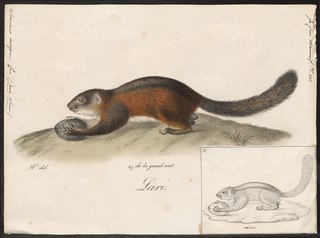
Striped ground squirrels form a taxon of squirrels under the subfamily Callosciurinae. They are only found in Southeast Asia. Species in this genus include:

An IUCN Red List Critically Endangered species is one that has been categorized by the International Union for Conservation of Nature as facing an extremely high risk of extinction in the wild. As of 2021, of the 120,372 species currently tracked by the IUCN, there are 8,404 species that are considered to be Critically Endangered.

Notiosorex cockrumi, also called Cockrum's gray shrew or Cockrum's desert shrew, is a tiny species of shrews named in 2003. This red-toothed shrew, which is as light as a penny, is the first new mammal species from Arizona since 1977. Its range extends from Arizona to central Sonora, Mexico.

The Hainan hare is a hare endemic to Hainan Island, China. The species was first described by Robert Swinhoe in 1870.

A species that is extinct in the wild (EW) is one that has been categorized by the International Union for Conservation of Nature as known only by living members kept in captivity or as a naturalized population outside its historic range due to massive habitat loss.
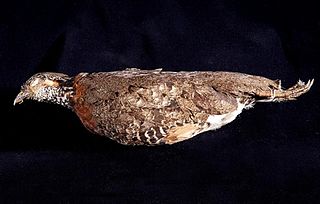
The chestnut-necklaced partridge is a species of bird in the family Phasianidae. It is found in forests in the Malay Peninsula and Sumatra. It is threatened by habitat loss and trapping. The International Union for Conservation of Nature (IUCN) has assessed it as vulnerable.

Villa's gray shrew is a shrew native to northeastern Mexico, where it is called musaraña.

The grey-throated warbler is a species of bird in the family Parulidae.
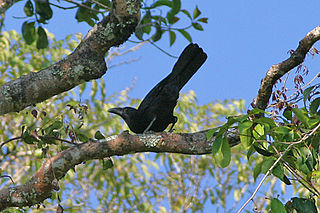
The Flores crow is a species of bird in the family Corvidae. It is endemic to Indonesia.
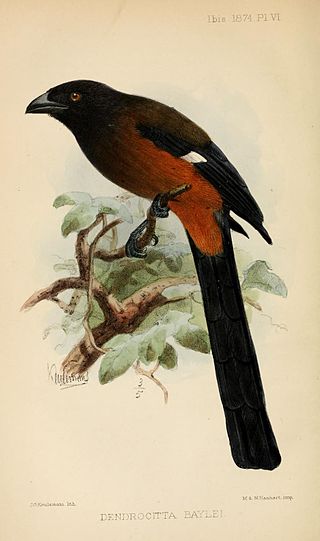
The Andaman treepie is a species of bird in the family Corvidae. First described by Robert Christopher Tytler in 1863, it is endemic to the Andaman Islands of India, where its natural habitat is subtropical or tropical moist lowland forests. It is threatened by habitat loss.

The whiskered flowerpecker is a species of bird in the family Dicaeidae. It is endemic to the island of Mindanao in the Philippines.
The short-crested monarch is a species of bird in the family Monarchidae. It is endemic to the Philippines. It is found in tropical moist lowland forest. It is threatened by habitat loss.

Day's shrew is a species of mammal in the family Soricidae. It is endemic to India. Its natural habitat is subtropical or tropical dry forests. It is threatened by habitat loss.
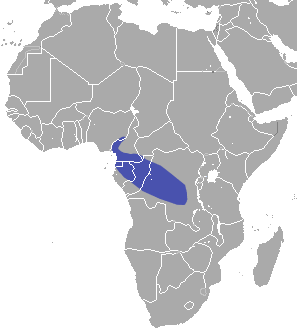
The greater forest shrew is a species of mammal in the family Soricidae found in Cameroon, the Central African Republic, the Republic of the Congo, Equatorial Guinea, Gabon, and Nigeria. Its natural habitat is subtropical or tropical moist lowland forest.

Nehalennia speciosa is a species of damselfly in the family Coenagrionidae. It is found in Austria, Belarus, Belgium, the Czech Republic, Denmark, Estonia, Finland, Germany, Italy, Japan, North Korea, Latvia, Lithuania, Luxembourg, the Netherlands, Poland, Romania, Russia, Slovakia, Sweden, Switzerland, Ukraine, possibly France, and possibly Kazakhstan. Its natural habitats are swamps, freshwater marshes, and open excavations. It is threatened by habitat loss.
Eugenia pallidula is a species of plant in the family Myrtaceae. It is a tree endemic to Peninsular Malaysia. It is threatened by habitat loss.
Bat Conservation International (BCI) is an international nongovernmental organization working to conserve bats and their habitats through conservation, education, and research efforts.

Nehalennia is a genus of very small damselflies in the family Coenagrionidae. Most of the species are commonly known as Sprites. One species, N. speciosa occurs in Eurasia; the rest in North and South America.

The Flores monarch is a species of bird in the family Monarchidae. It is endemic to the western half of the island of Flores in Indonesia.














